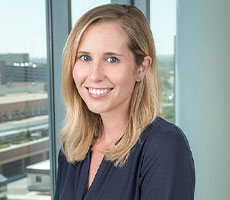LGBTQ+ Health Equity
DFM Researcher Studies Cause and Cure for Health Disparities
Robert | Family Medicine Dec 18, 2019
Over this past year, the Department of Family Medicine’s Rebecca Mullen, MD, attended immersion training offered through the Colorado Clinical and Translational Sciences Institute (CCTSI). LGBTQ community immersion training to be exact.
While there, she had an experience that she says opened her eyes. Here’s how she explains it in our latest Research Reachout:
“During the immersion training, we met with a variety of community organizations and leaders. We heard stories of researchers coming in to the community with important ideas, but the projects would often fall flat and be unsuccessful. In the end, this was not necessarily because the ideas were poor, but rather because there was not community buy-in. One particularly powerful story actually came from one of our community research liaisons. She researches obesity and had received funding to pilot a physical activity program with lesbian individuals. However, when she took this idea out to community members, leaders, and organizations, she was met with disinterest. Despite the known increased prevalence of obesity in lesbian individuals, this was not a current health priority for the community. The project was ultimately unsuccessful in engaging participants. This story is a striking reminder of the importance in community partnership- if we aren’t even asking the right research questions from the start, the questions that are generated and supported by the community, then how could our research possibly reach its potential and have a significant impact on health disparities?”
Dr. Mullen is now on course with not one, but two health equity research projects focused on the LGBTQ+ community.
We sat down to learn more about Mullen’s latest research passion:
You’ve been and remain heavily committed to research in the area of loneliness and its effects on health. But, now you have an additional research interest. Tell us what that is? Does it have an official name?
Over the past year I have been trying to do more work with sexual and gender minority populations. Often termed LGBTQ+ for brevity and inclusivity, this includes lesbian, gay, bisexual, transgender, queer, and other communities. There is no official name to this, but I would say that it falls under the general umbrella of health equity research. LGBTQ+ populations suffer from innumerable health disparities, so research efforts in this area aim to address some of these inequities.
You have some initial grant money to get the wheels turning. Tell us about those grants.
Since the immersion training last fall, I’ve applied for four grants that involve LGBTQ+ health in some way… and have received two! One project has a clinical focus while the other is more community-oriented.
The first project, funded by the UCH Clinical Effectiveness and Patient Safety (CEPS) grant program, aims to use quality improvement initiatives to ensure that high-quality, comprehensive, and sensitive care is delivered to transgender and non-binary patients at AF Williams Family Medicine clinic. I’m working with Shandra Brown-Levey as Co-PI and an awesome team (Cat Halliwell, Ryan O’Connell, Dionisia Delacerda, Kathy Cebuhar, and others).
The second project, funded by the Lesbian Health Foundation, aims to better understand disparities that lesbians face when accessing end of life care. My co-PI is Carey Candrian, a colleague from CIT, and we are partnering with Leslie Wright, our CIT community-research liaison, and One Colorado, a statewide LGBTQ policy and advocacy organization, to create a community advisory board that will help inform this work.
What are your objectives in this research? What do you hope to better understand?
I think just like most researchers involved in participatory and health equity research, I’m hoping to partner with communities to eliminate health disparities and achieve the highest level of health. Rather than going in with a specific research agenda, I think that it’s important to focus on the health needs and priorities as driven by the LGBTQ+ patients and communities.
What are your next steps?
Well most immediately, my focus is on my current projects. The overall goal of both projects is to generate information and create solutions that may positively impact health disparities- in one, emphasizing transgender health care in the primary care setting and in the other, focusing on the lesbian experience with end of life care.
And from there, I hope to continue fostering partnerships in the LGBTQ+ communities and applying for funding that supports community-empowered research and solutions.